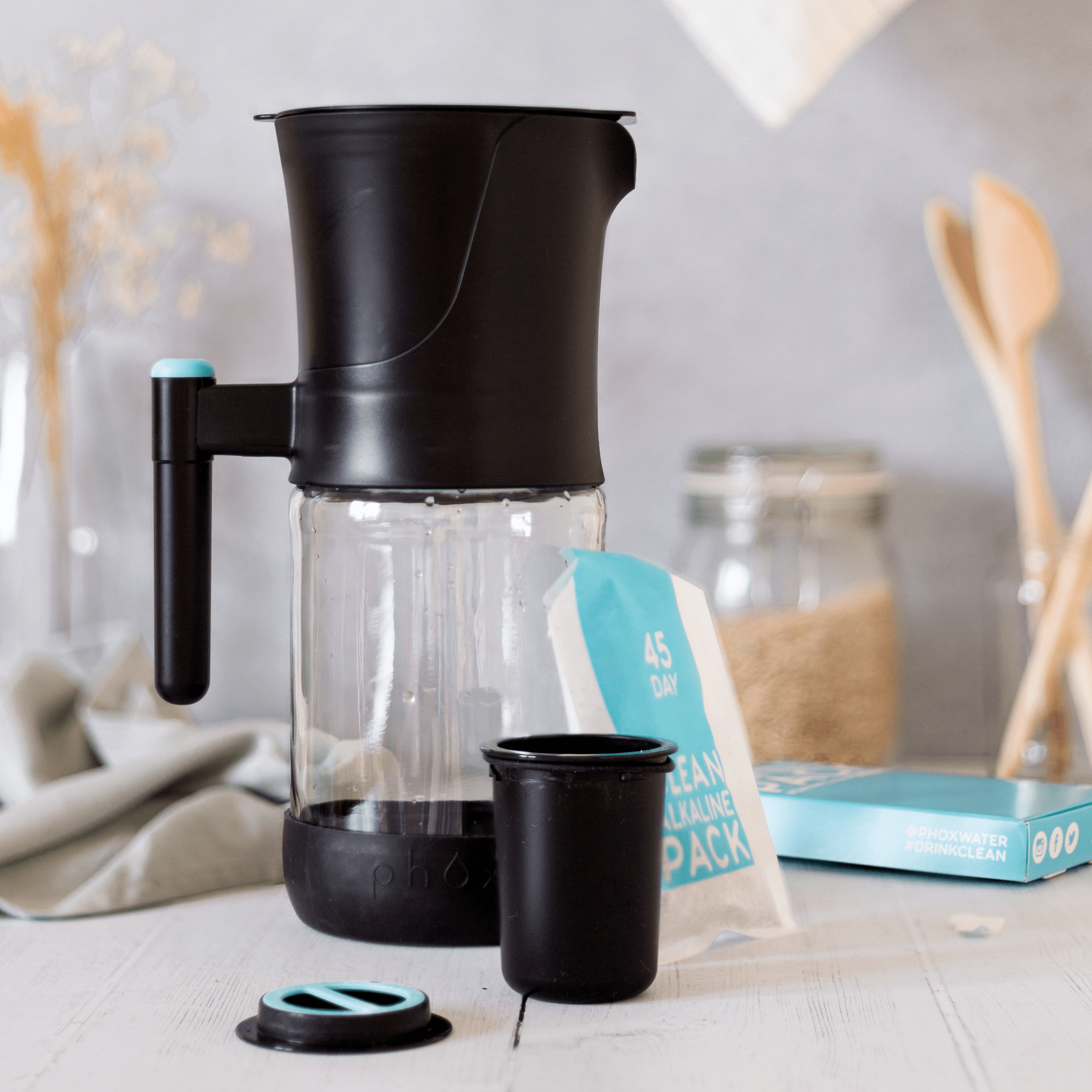How to Reduce Microplastic Pollution in Daily Life
How to Reduce Microplastic Pollution in Daily Life
Have you ever wondered how much plastic you might be unknowingly consuming?
Research shows that the average person ingests a credit card’s worth of plastic every week. Worse yet, Microplastics—tiny particles originating from synthetic fabrics, cosmetics, and plastic debris—are everywhere. They are in the air we breathe, the water we drink, and even in our food. But how can we fight back against the growing crisis of plastic waste reduction and microplastic pollution? We’ll explore practical, everyday actions you can take to reduce microplastic pollution. From ditching bottled water to choosing microplastic-free products, you’ll learn how small changes can make a big impact.

Let’s dive into why it matters, what you can do, and how Phox Water can help.
Estimated reading time | 7 minutes.
Click to Skip to . . .
- 5 Actionable Steps to Reduce Microplastic Pollution
- Understanding Microplastic Pollution
- Common Misconceptions About Microplastic Pollution
- Frequently Asked Questions About Microplastics
- A Cleaner Future Starts with You
5 Actionable Steps to Reduce Microplastic Pollution
Microplastic pollution may seem overwhelming. However, small, actionable steps in daily life can make a significant difference. Let’s break it down . . .
1. Start with Your Daily Routine
Toothpaste and Cosmetics
- Opt for products labelled microplastic-free.
- The UK banned microbeads in rinse-off cosmetics in 2018. (Gov.uk)
Read our blog on Making Your Beauty Routine Sustainable for more sustainable beauty tips.
Laundry Practices
- Use a microfiber-catching laundry bag.
- Wash less frequently and at cooler temperatures to minimise fibre shedding. Synthetic fabric microfiber pollution makes up much of the ocean's microplastics. Therefore, it's vital to use solutions like microfiber-catching laundry bags.
2. Ditch the Bottled Water
Switch to a reusable water bottle paired with a home filtration system. Phox Water’s eco-friendly water filter range has helped eliminate the need for single-use plastic bottles.
Learn more about Eco-Friendly Refreshment with Reusable Water Filter Jugs.
3. Choose Sustainable Clothing
- Opt for natural fabrics like organic cotton or hemp.
- Buy second-hand or invest in high-quality items that last longer. Opting for sustainably sourced fabrics reduces your environmental footprint while combating microfiber pollution.
4. Rethink Cleaning and Household Products
- Replace plastic sponges with biodegradable alternatives.
- Avoid cleaning products with microplastic-containing thickeners or fragrances.
5. Advocate for Larger Change
- Support local legislation banning harmful plastics.
- Join clean-up drives or campaigns aimed at reducing microplastic pollution.
Understanding Microplastic Pollution
Microplastics can be divided into two categories . . .
- Primary microplastics: Tiny particles intentionally manufactured, such as microbeads in toothpaste and cosmetics.
- Secondary microplastics: Fragments that result from the breakdown of larger plastic items like bottles and bags.
These particles are particularly concerning. Why? Because they are ingested by marine life, enter food chains, and have even been detected in human organs and tissues!
The Scale of the Problem
- An estimated 11 million metric tonnes of plastic waste enter the oceans annually.
- Ocean microplastic contamination is a global crisis affecting biodiversity and marine ecosystem health.
- According to the World Health Organization (WHO), 90% of bottled water contains microplastic contamination.

Common Misconceptions About Microplastic Pollution
Reusable items like tote bags and metal straws are popular alternatives to single-use plastics. While they’re a step in the right direction, they’re not a cure-all. For example, a cotton tote bag requires 131 uses to offset its production impact compared to a single-use plastic bag. So, what's the takeaway? Choose high-quality, durable alternatives and commit to using them consistently for maximum impact.
Do Microplastics Only Come From Visible Plastics?
Hidden sources of microplastics include . . .
- Car tyres: A leading contributor to microplastic pollution in urban areas.
- Synthetic clothing: Each wash can release 700,000 microfibres into waterways and notably add to microfiber pollution.
- Paints: Significant sources of microplastics in marine environments.
Frequently Asked Questions About Microplastics
What are microplastics, and where do they come from?
Microplastics are tiny plastic particles less than 5mm in size. They come from primary sources, such as microbeads in cosmetics, and secondary sources, like the breakdown of larger plastic items, such as bottles or bags. Microplastics have entered ecosystems and food chains globally and can be found in oceans, soil, and even the air we breathe (UNEP).
How can I reduce microplastic pollution at home?
Start by making small changes: use reusable water bottles, switch to natural fabrics, install a microfiber-catching laundry bag, and avoid products with microbeads. For sustainable filtration, consider refillable water filter cartridges, like those from Phox Water.
Do microplastics equally contaminate bottled water and tap water?
Studies have found microplastics in both bottled and tap water, but bottled water often contains higher levels. According to WHO, approximately 90% of bottled water samples tested globally showed contamination. Using refillable water filters can help reduce exposure.
Do natural fabrics completely solve the microfiber issue?
Natural fabrics like cotton and hemp are better than synthetics. They reduce microfiber pollution, but they aren't perfect. The production of some natural fabrics, such as conventional cotton, has a high environmental footprint. Therefore, it's worth opting for sustainably sourced or organic options.
How does Phox Water help combat microplastic pollution?
Phox Water's refillable filter cartridges are a sustainable alternative to traditional filters. After all, they often end up in landfills! Phox Water aims to reduce single-use plastics and ensure clean, great-tasting water. Together, we'll tackle microplastic pollution while promoting eco-friendly habits.
A Cleaner Future Starts with You
Clean water and less plastic—wouldn't that be fantastic?!
Reducing microplastic pollution doesn’t have to be complicated. Small changes, like rethinking daily habits and choosing sustainable solutions, can have a big impact. With the Phox Wave 2.8L Water Filter Jug, you can eliminate single-use plastics and enjoy clean, eco-friendly water that’s better for you and the planet. Designed for sustainability, our refillable cartridges are a game-changer in reducing waste. Don’t wait—start your journey to a healthier lifestyle today. Buy the Phox Wave now and enjoy free shipping on your first order.
Your choice matters; together, we can create a cleaner, greener future.


